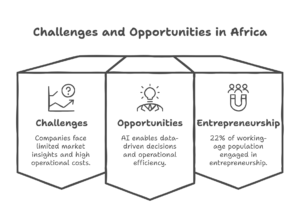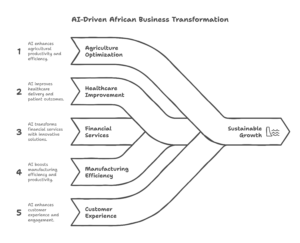Artificial Intelligence (AI) is no longer a futuristic concept; it has become a present-day necessity that is reshaping industries worldwide, and Africa is no exception. While some may view AI as a complex or distant technology, the reality is that businesses on the continent—both large and small—can use AI to drive sustainable growth, improve efficiency, and gain a competitive advantage. The key to success lies in implementing AI effectively and strategically.
The AI market in Africa is projected to reach $1.54 billion by 2025, with an expected annual growth rate (CAGR) of 27.42% from 2025 to 2030, resulting in a market volume of $5.16 billion by 2030. This growth highlights the significant opportunities for businesses to integrate AI solutions, overcome traditional barriers, and position themselves for long-term success.
AI has the potential to address critical challenges such as food security, financial inclusion, and healthcare access, making it a transformative force for Africa’s economy. However, despite its promise, the adoption of AI remains uneven. Many enterprises face technological and infrastructural limitations that hinder full-scale implementation and innovation.
This article explores AI’s importance for African businesses, how it can be implemented, and the practical steps businesses can take to leverage AI for sustainable growth and economic transformation.
The AI Landscape in Africa
Africa is currently at a crucial turning point in its economic development, with the potential to harness artificial intelligence (AI) to greatly improve business efficiency and stimulate growth across various sectors. However, the adoption of AI-driven solutions remains limited, as many companies are still at the lower end of the technology adoption spectrum. This situation presents both challenges and opportunities for businesses eager to innovate and enhance their operational efficiency.
The relationship between Africa and AI is unique. While the continent grapples with infrastructure gaps, skill shortages, and digital divides, it also has considerable advantages, including a young, tech-savvy population, rapidly increasing mobile connectivity, and the potential to bypass outdated systems that have hindered innovation in other regions. These factors position Africa as an ideal candidate for AI-driven transformation.
This economic potential reflects the growing awareness among African businesses that AI is not just a technological tool; it is a strategic asset for sustainable growth and long-term competitiveness. As companies increasingly adopt AI, those who can effectively navigate the challenges and capitalise on the opportunities will gain a significant advantage in Africa’s evolving digital economy.
Why AI Matters for African Businesses

Africa’s rapidly growing population, increasing internet access, and vibrant entrepreneurial landscape offer significant opportunities for businesses. However, companies face several challenges, including limited market insights, high operational costs, inefficiencies in supply chains, and constraints in customer service.
Artificial Intelligence (AI) provides solutions by enabling data-driven decision-making, improving operational efficiency, and facilitating scalability. It is transforming various industries—ranging from agriculture and manufacturing to healthcare and education—by addressing local challenges and promoting inclusive economic growth.
With 22% of Africa’s working-age population engaged in entrepreneurship, AI can equip businesses with essential tools for market analysis, automation, and strategic decision-making. This empowerment helps entrepreneurs navigate a competitive landscape and drive sustainable growth.

5 Ways African Businesses Can Use AI for Sustainable Growth
Artificial Intelligence (AI) is revolutionising various African sectors, offering innovative solutions to longstanding challenges and paving the way for sustainable growth. Here are five key areas where African businesses can harness AI:
- Enhancing Customer Experience with AI Chatbots
Effective customer service is essential for business success, but many companies in Africa struggle with high support costs and slow response times. AI-powered chatbots offer solutions by providing 24/7 support, automating responses to frequently asked questions, and enabling personalised interactions. For example, integrating AI-driven chatbots can help users resolve payment issues more efficiently. Small businesses can use AI chatbots like ChatGPT, Drift, or Freshchat to manage inquiries without the need to expand their staff.
- AI-Driven Marketing and Sales Optimization
AI is transforming marketing strategies by analysing customer behaviour to create targeted campaigns, optimising advertising budgets through the identification of high-converting audiences, and automating email marketing and social media engagements. E-commerce platforms, for example, utilise AI to personalise product recommendations, thereby boosting customer retention and sales. Businesses can leverage AI tools like HubSpot, Marketo, or Google AI-powered ads to enhance their marketing efforts.
- Data-Driven Decision Making
Many African businesses have traditionally relied on intuition rather than data insights. AI facilitates informed decision-making by predicting market trends, analysing large datasets swiftly, and identifying operational inefficiencies. Companies like Twiga Foods in Kenya use AI to optimise supply chains, reducing waste and efficiency. Businesses can employ AI-powered analytics tools such as Google Analytics, Power BI, or Tableau to transform raw data into actionable insights.
- Improving Supply Chain and Logistics Efficiency
Supply chain disruptions pose significant challenges for African businesses. AI can predict demand fluctuations, optimise delivery routes, and minimise wastage, particularly in perishable goods sectors. Logistics startups like Lori Systems utilise AI to enhance freight transport efficiency. Companies in logistics and retail can implement AI solutions like SAP AI or IBM Watson to streamline operations.
- AI-Powered Fraud Detection and Cybersecurity
With the rise of digital transactions in Africa, fraud risks have escalated. AI enhances security by detecting suspicious activities in real time, identifying cyber threats proactively, and mitigating financial losses due to fraud. Payment companies like Interswitch in Nigeria leverage AI to safeguard users against cyber threats. Businesses handling financial transactions should consider integrating AI-driven security solutions such as Kaspersky AI, Darktrace, or IBM Security AI.
Strategies for Successful AI Adoption
To effectively integrate AI, African businesses should consider the following strategies:
- Building Capacity and Skills
Investing in training programs is crucial to equip stakeholders with the skills needed to operate and maintain AI systems. This commitment to education fosters innovation and adaptability, enhancing economic resilience.
- Fostering Public-Private Partnerships
Collaborations between governments and private sectors are essential for promoting AI adoption. Such partnerships facilitate data sharing and create conducive environments for AI growth, leading to tailored solutions that address local challenges.
- Infrastructure Development
Enhancing digital infrastructure is vital for effective AI implementation. Collaborations with technology providers can ensure access to necessary digital tools, overcoming barriers like high costs and limited computing power.
- Embracing Innovation through Collaboration
Cross-sector collaborations combining diverse expertise can lead to innovative, AI-driven solutions tailored to African markets. Engaging in dialogues among entrepreneurs, researchers, and policymakers fosters the co-creation of AI applications that reflect local contexts.
- Continuous Learning and Adaptation
As AI technologies evolve, continuous learning is imperative. Programs targeting underrepresented groups in AI research promote inclusivity and innovation, positioning African businesses to leverage AI for sustainable growth.
AI is Not Just for Big Companies
The perception that AI is exclusive to large corporations is a misconception. Today, AI tools are affordable, accessible, and scalable for small and medium-sized businesses. By embracing AI, African enterprises can unlock new growth opportunities, enhance efficiency, and maintain competitiveness in an increasingly digital world.
At Marketing Analytics Africa (MAA), we assist African businesses in harnessing data and AI-driven marketing strategies to drive sustainable growth. Follow us for more insights, strategies, and success stories on how data is transforming businesses across the continent.




